施設概要
ABOUT
The Glasses City’s SDGs
The city of Sabae has flourished throughout the years with its local glasses, textile, and lacquerware industries. This prosperity is attributed women’s involvement in the community, citizen innovation and ingenuity across generations, as well as the regional characteristic in which each person is able to thrive as a local leader.
The SDGs (Sustainable Development Goals) introduced by the United Nations in September 2015 strongly resonate with the city of Sabae’s history of its citizens coming together to build a strong community. In accordance with the SDGs promise to leave no one behind, Sabae strives to advance the SDGs with gender equality as a core value, a concept that has helped to build the city that we have today.
The Resource Center for Implementation of the SDGs in SABAE was established in 2020, marking the start of the 10 years of action towards the completion of the SDGs which are scheduled to come to an end in 2030. With climate change causing disasters across the world and the global COVID-19 pandemic, both the country of Japan as a whole and its prefectures have recognized the importance of the SDGs, and are currently working to speed up the achievement of the Global Goals.
While the SDGs are a universal goal, they are also goals for each and every single person. The city of Sabae will continue to strive for the advancement of the SDGs with its citizens, economic sector, local entities, and education facilities coming together at the hub that is the Resource Center for Implementation of the SDGs in SABAE.
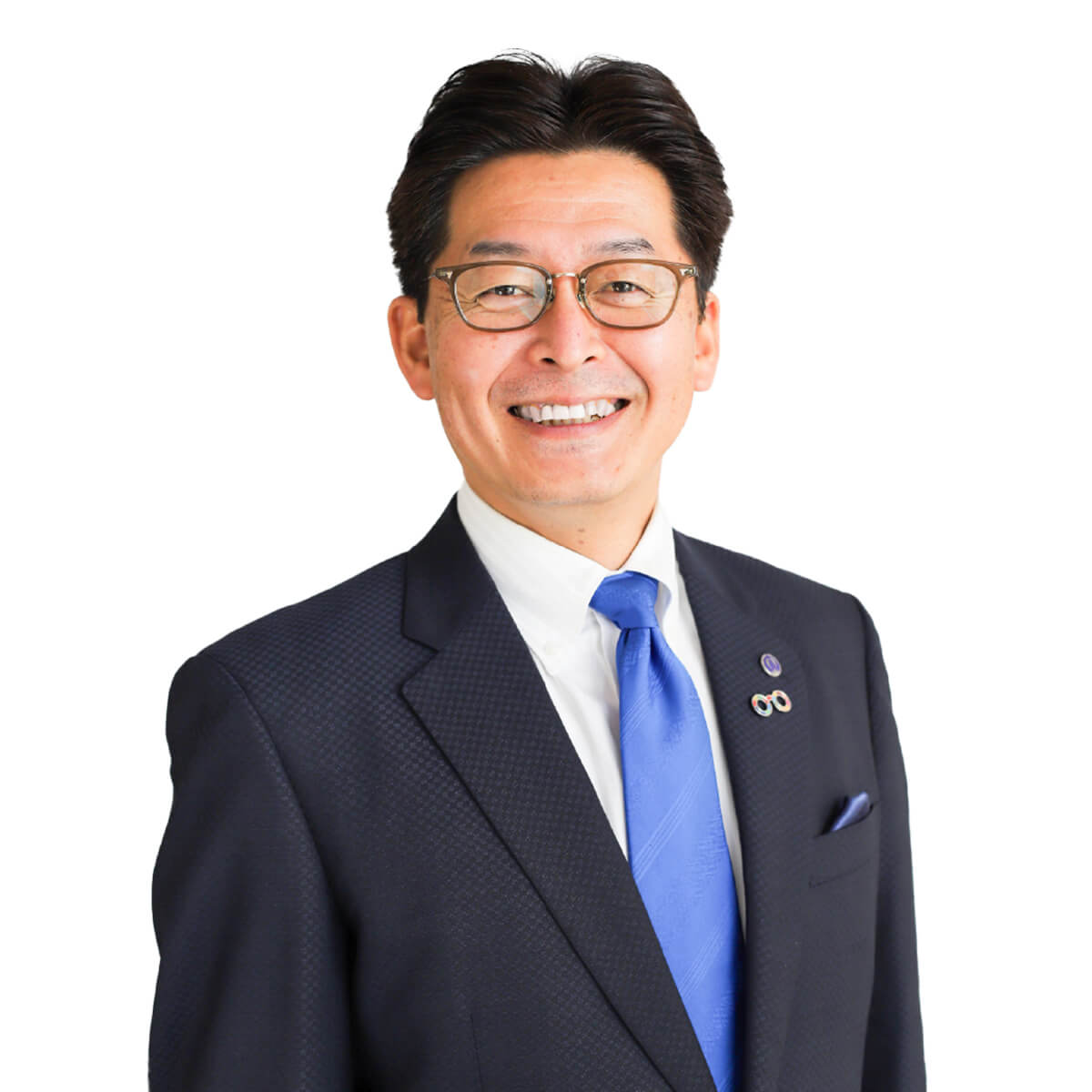
Mayor of Sabae
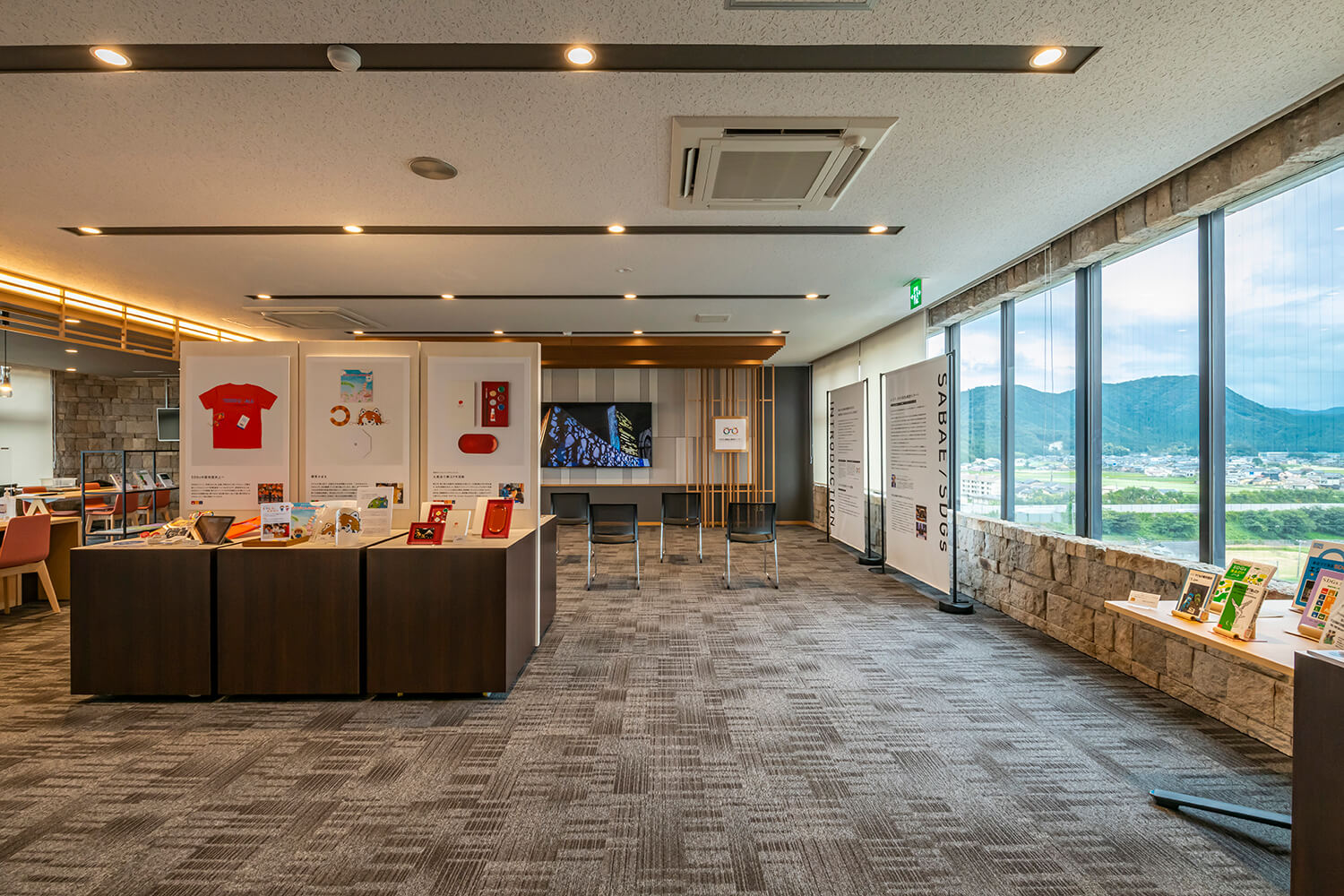
The Resource Center for Implementation of the SDGs in SABAE
The Resource Center for Implementation of the SDGs in SABAE, known colloquially as ‘the Center’, is a facility run by the city of Sabae and is located on the 9th floor of the Megane Kaikan, a prominent regional landmark. The Center first opened its doors in September 2020 and functions as a local epicenter for all things SDGs, bringing together businesses, schools, entities, and individuals so that they can cooperate in promoting stable growth amongst the 3 dimensions of the SDGs: economy, society, and environment.
The Center not only showcases Sabae’s actions towards the SDGs through various exhibits and video footage, but also acts as a venue to participate in the SDGs via seminars, workshops, and special events related to the many themes found throughout the Global Goals.
The Center’s SDGs Actions
・Partnerships with Stakeholders
It is necessary for every one of us to relate to the SDGs in order for them to be achieved, and it is for this reason that the Center strives to work together with many stakeholders to share information and implement a wide variety of SDGs themed projects.
Some examples of the Center’s partnerships across various fields include: ・Online and in-person student field trips to the Center ・Training/Seminars for businesses, entities, and students based on the SDGs ・Events related to the SDGs such as card games, movie screenings, and book club meetings ・SDGs related support from Center staff
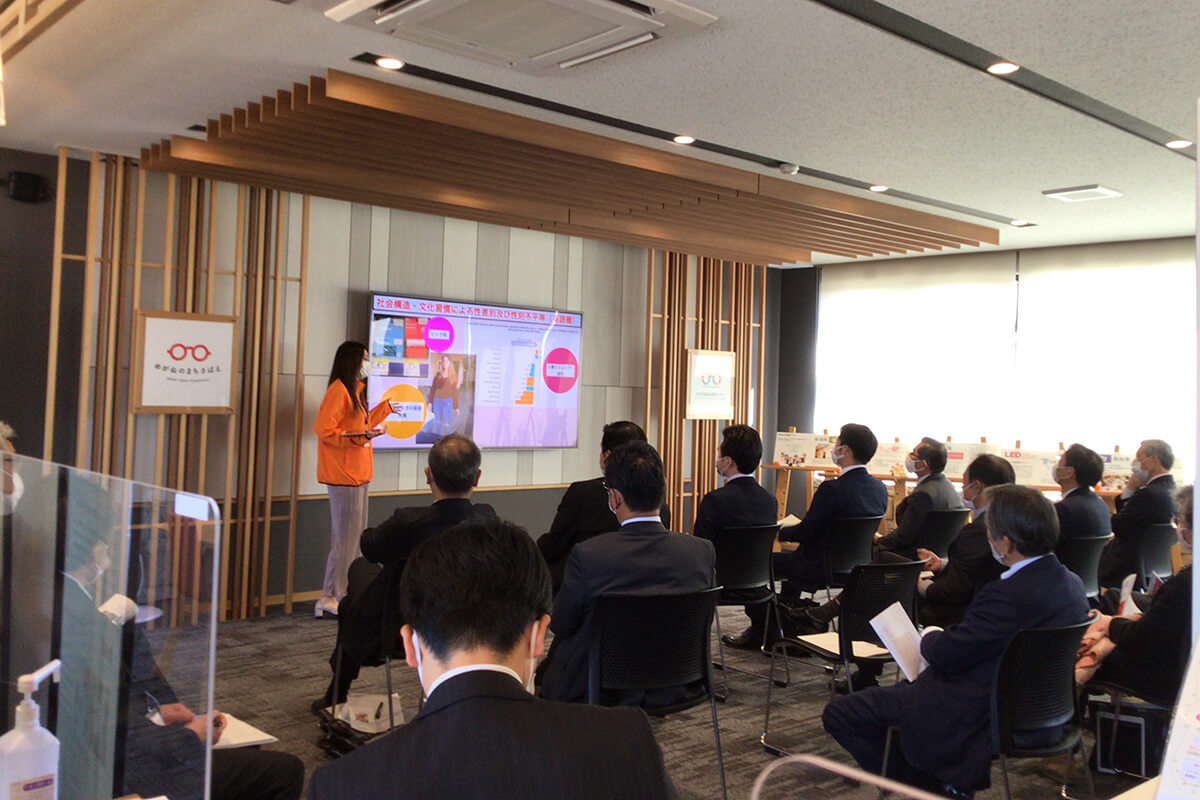
・SDGs Implementation Centered Around Goal 5, Gender Equality
The city of Sabae strongly believes that empowering women empowers the local community, and as such implements many measures to strive for gender equality in order to create a sustainable community.
As a part of Sabae’s SDG5 initiatives, the city holds many events every year during the month of March for International Women’s Day (March 8th) to celebrate all of the women in the local community, further promoting gender equality throughout the region.
・Social Media and Information Sharing
The Center uses social media as a tool to promote knowledge of Sabae’s actions towards the SDGs both locally and internationally. The Center also shares information pertaining to the SDGs from countries outside of Japan so that Sabae’s citizens may further their understanding of the Global Goals and be more aware of what they can do to contribute to them.
The city of Sabae created the glasses-shaped SDGs Glocal signature mark to promote the SDGs and increase citizen awareness on the Global Goals.
The Glocal mark melds a major local industry, eyeglasses, with the SDGs to create a symbol that captures the 17 SDGs through a local lens and a global lens connected together with an SDG5 coloured bridge, encapsulating the premise that gender equality is essential to achieving the SDGs.
Sabae’s Glocal mark is used locally throughout the city to encourage participation in the SDGs.
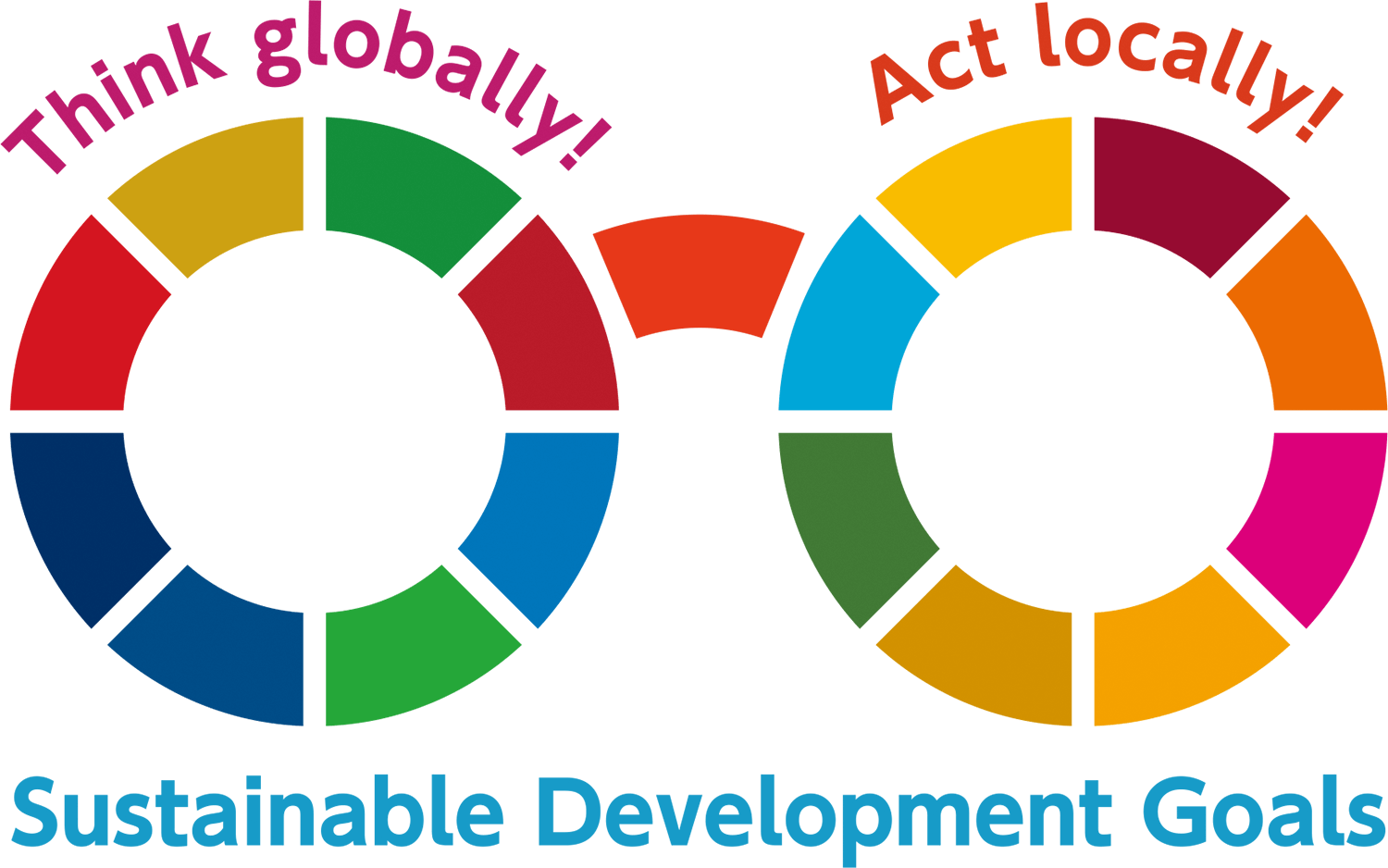
I am Anwarul K. Chowdhury, Honorary Advisor to the Center. My affiliation with the City of Sabae starts over 10 years ago. I have always praised Sabae as home to world class eyeglasses, lacquerware, and textile industries that continue to innovate with new technological development supported by the citizens who take great pride in their local community and are proactive in being involved throughout the region across various fields. I feel that the people of Sabae - local businesses, entities, and municipal government all working together to better the city - is the way that local regions will be able achieve the SDGs. Without the help of its citizens, Sabae would not have been able to plant the seeds for the SDGs. Citizen action is the fertilizer needed for the SDGs to grow and succeed. People all across the world will benefit from the SDGs, however without efforts on a local level the goals will not be achieved. In addition, we must not forget women’s equality and empowerment. As a diplomat and United Nations officer, I have traveled to every country and region, and it is there that I saw firsthand just how important women’s involvement is towards encouraging peace and equality across all levels of society. Good countries, regions, and individuals cannot be realized without an equal society that does not judge based on gender or age.
As the world faces crisis, a hub for community innovation, original ingenuity, lifestyle connections is necessary. The Resource Center for Implementation of the SDGs in SABAE holds this position, and I anticipate that it will bring with it the opportunity to create a resilient and inclusive sustainable region.
Anwarul K. Chowdhury, Honorary Advisor of the Resource Center for Implementation of the SDGs in SABAE
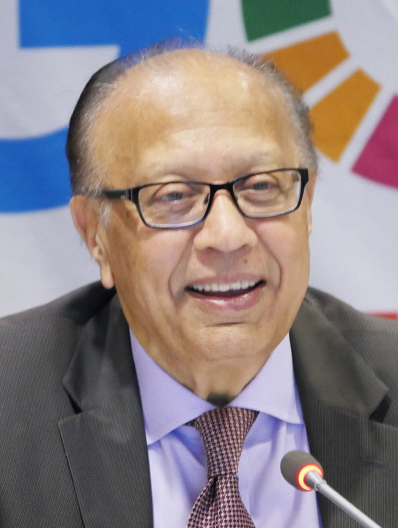
Ambassador Anwarul K. Chowdhury
Former United Nations Under-Secretary General & High Representative for the Least Developed Countries, Landlocked Developing Countries and Small Island Developing States Chairman of the Friends of the United Nations Asia-Pacific United Nations General Assembly
Ambassador Chowdhury served as President of the Security Council as the Permanent Representative of Bangladesh and President of the UNICEF Board. While in office, Ambassador Chowdhury held many roles such as President of the Security Council, President of the UNICEF Board, Vice President of the Economic and Social Council, as well as President of the UN General Assembly Fifth Committee (Administrative and Budgetary Committee). As a champion of peace and culture, Ambassador Chowdhury is the recipient of the U Thant Peace Award and the UNESCO Gandhi Gold Medal for Culture of Peace. Ambassador Chowdhury created the draft for resolution 1325 in 2000, the first security measure for women’s peace to be adopted by the Security Council since the founding of the United Nations. Ambassador Chowdhury continues to act as an advocate for women’s issues throughout the United Nations.



